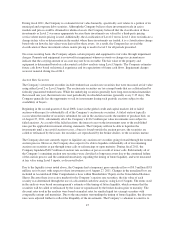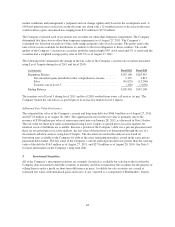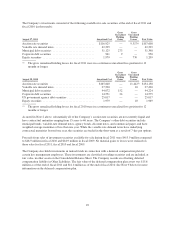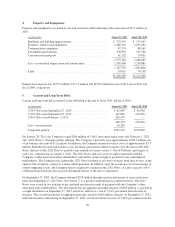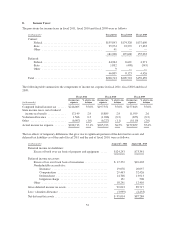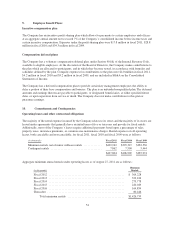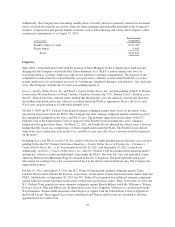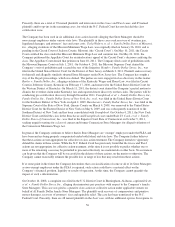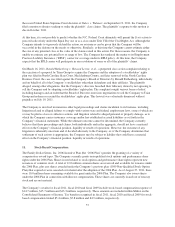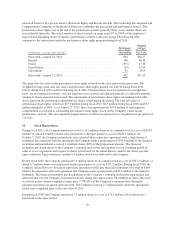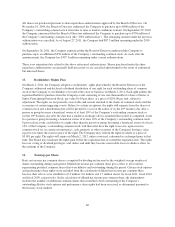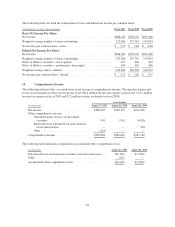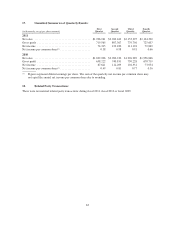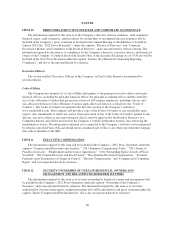Family Dollar 2011 Annual Report Download - page 60
Download and view the complete annual report
Please find page 60 of the 2011 Family Dollar annual report below. You can navigate through the pages in the report by either clicking on the pages listed below, or by using the keyword search tool below to find specific information within the annual report.Presently, there are a total of 39 named plaintiffs and intervenors in the Grace and Ward cases, and 65 named
plaintiffs and/or opt-ins in the remaining cases, for which the N.C. Federal Court has not decided the class
certification issue.
The Company has been sued in six additional class action lawsuits alleging that Store Managers should be
non-exempt employees under various state laws. The plaintiffs in these cases seek recovery of overtime pay,
liquidated damages, and attorneys’ fees and court costs. Twila Walters et. al. v. Family Dollar Stores of Missouri,
Inc., alleging violations of the Missouri Minimum Wage Law, was originally filed on January 26, 2010, and is
pending in the Circuit Court of Jackson County, Missouri (the “Circuit Court”). On May 10, 2011, the Circuit
Court certified the class under the Missouri Minimum Wage Law and common law. On May 20, 2011, the
Company petitioned the Appellate Court for an interlocutory appeal of the Circuit Court’s decision certifying the
class. The Appellate Court denied that petition on June 10, 2011. The Company filed a writ of prohibition with
the Missouri Supreme Court on July 1, 2011. On October 4, 2011, the Missouri Supreme Court denied the
Company’s writ of prohibition and vacated the stay of the litigation. Hegab v. Family Dollar Stores, Inc., was
filed in the United States District Court for the District of New Jersey on March 3, 2011. Plaintiff seeks recovery
for himself and allegedly similarly situated Store Managers under New Jersey law. The Company has sought a
stay of the Hegab proceedings, which was denied. The parties are now engaged in class discovery in this matter.
Barker v. Family Dollar, Inc., alleging violations of the Kentucky Wages and Hours Law, was filed in Circuit
Court in Jefferson County, Kentucky on February 17, 2010, and removed to the United States District Court for
the Western District of Kentucky. On March 11, 2011, the district court denied the Company’s partial motion to
dismiss the overtime claim under Kentucky law and requested more discovery on that claim. The parties will be
conducting pre-certification discovery through December 2011. Youngblood, et al. v. Family Dollar Stores, Inc.,
Family Dollar, Inc., Family Dollar Stores of New York, Inc. et al., was filed in the United States District Court
for the Southern District of New York on April 2, 2009. Rancharan v. Family Dollar Stores, Inc., was filed in the
Supreme Court of the State of New York, Queens County on March 4, 2009, was removed to the United States
District Court for the Eastern District of New York on May 6, 2009, and was subsequently transferred to the
Southern District of New York and has been consolidated with Youngblood. On October 4, 2011, the New York
District Court certified the class in the Rancharan and Youngblood cases under Rule 23. Cook, et al. v. Family
Dollar Stores of Connecticut, Inc., was filed in the Superior Court State of Connecticut on October 5, 2011,
seeking unpaid overtime for a class of current and former Connecticut Store Managers for alleged violations of
the Connecticut Minimum Wage Act.
In general, the Company continues to believe that its Store Managers are “exempt” employees under the FLSA and
have been and are being properly compensated under both federal and state laws. The Company further believes
that these actions are not appropriate for collective or class action treatment. The Company intends to vigorously
defend the claims in these actions. While the N.C. Federal Court has previously found that the Grace and Ward
actions are not appropriate for collective action treatment, at this time it is not possible to predict whether one or
more of the remaining cases may be permitted to proceed collectively on a nationwide or other basis. No assurances
can be given that the Company will be successful in the defense of these actions, on the merits or otherwise. The
Company cannot reasonably estimate the possible loss or range of loss that may result from these actions.
If at some point in the future the Company determines that a reclassification of some or all of its Store Managers
as non-exempt employees under the FLSA is required, such action could have a material effect on the
Company’s financial position, liquidity or results of operation. At this time, the Company cannot quantify the
impact of such a determination.
On October 14, 2008, a complaint was filed in the U.S. District Court in Birmingham, Alabama, captioned Scott,
et al. v. Family Dollar Stores, Inc., alleging discriminatory pay practices with respect to the Company’s female
Store Managers. This case was pled as a putative class action or collective action under applicable statutes on
behalf of all Family Dollar female Store Managers. The plaintiffs seek recovery of compensatory and punitive
money damages, recovery of attorneys’ fees and equitable relief. The case has been transferred to the N.C.
Federal Court. Presently, there are 48 named plaintiffs in the Scott case, with no additional opt-ins. In response to
56



